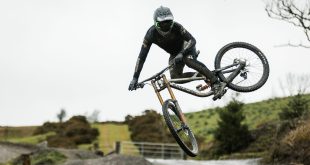The Flying Dutchman is a legendary ghost ship that is doomed to sail the oceans for ever. Or, and of more relevance to a bicycle trade magazine, it’s a new bike shop in London, selling Dutch bikes.
Created by 27-year-olds Harry Walton and Kristina Rimkutė The Flying Dutchman is on Eversholt Street in Camden, behind Euston Station. The 38-metre-sq shop was previously a pharmacy but was derelict for more than a year. Before that it was a butcher’s shop. The couple gutted the place, learning DIY in the process. And they are learning retail skills on the job, too: neither have any shop experience; both are former academics. They met at Edinburgh University; Walton was on a PhD programme specialising in philosophy, and Rimkutė studied architecture and conservation.
“We knew we didn’t want to be academics,” said Rimkutė. “We were tired of it. We wanted to do something different, something creative.”
Originally from Lithuania, Rimkutė said she was thoroughly enjoying the transition from academia to the world of bicycle retail: “It’s very satisfying that you can help people,” she said.
“You can see from their reactions when they take kids on a family bike that you’re transforming lives. Faces light up.”
The Flying Dutchman retails high-quality Dutch-bikes from Gazelle, BSP, WorkCycle and others. It opened for business in September last year.
“The website went live in the summer and we sold a pallet of bikes before we even opened our doors,” said Walton. “Real Dutch-bikes have a reputation. There’s a strong demand for them.”
The first bikes were sold to Dutch ex-pats living in London.
“Dutch people see these bikes as vehicles, not toys,” said Walton. “They are for transport, for transporting the family or for cargo.”
Rimkutė added: “We’re not competing just with bike shops, we’re competing with car showrooms.”
Bikes at The Flying Dutchman start at £400.
“A Dutch bike comes with lights, mudguards, a rack, an integrated lock, and a chaincase,” said Walton. “These are all part of the package but they would be extras on a normal bike. But they can still be chosen by the customer. A lot of our bikes are highly customised, to suit individual tastes.”
Camden Council bought three of the shop’s Dutch-bikes, for use by Bangladeshi women.
“They don’t have exercise as part of their culture so obesity was becoming a problem for women who no longer have to do manual labour. The council bought three Dutch-bikes from us. They’re ideal bikes for riding in traditional dress.”
The shop is rented from the council, and was a wreck before Walton and Rimkutė got their hands on it.
“There were holes in the floor, and broken windows,” said Walton. “It was a mess, and little more than a shell. We renovated it, doing everything ourselves. All of the wood in the shop is reclaimed: I picked it up on a cargo bike when cycling around London.”
The couple live in Barnet, and ride to work each day, sometimes on electric bikes.
“We ride just over 10kms in our ordinary clothes, and we get to cut through a park, which is very pleasant,” said Walton. “The amount we save on petrol, parking, vehicle excise city, Oyster cards, quickly offsets the price of the bike, and that’s something we tell our customers.
“These bikes are an investment. We enjoy our commute, and we think others should enjoy commuting, too.”
Rimkutė adds: “We overtake hundreds of cars while we ride. Lots of mums with one kid in a car. Because of all the cars the air is so foul. We don’t get stuck in traffic, and we get here in less than half an hour.”
This hands on approach – living the life – is appreciated by customers, said Walton.
“Sales have increased every month since we’ve been open. Dutch companies are now approaching us. When we first started some were not interested in talking to us. That’s not the case any more; we’re carving out a niche.”
Part of that niche, and part of that living the life, is becoming involved in London’s cycle-activism scene. Walton is on the organising committee of Stop Killing Cyclists, a campaign group which uses shock tactics, such as die-ins, to campaign for more spending on cycling infrastructure.
“Stop Killing Cyclists strikes a chord with me,” said Walton. “During that period in November 2013 when six people were killed on bikes in quick succession, I got on a train from Edinburgh to join the protests in London. As a Londoner living a long way away I felt I needed to add my voice to the protests. Having a bike shop in central London selling practical bikes is another form of getting this message across: that something needs to change in London.”
And plenty is changing in London. Not far from The Flying Dutchman one of the Cycle Superhighways likely to be built soon will give cyclists protection on Euston Road. With more and more of such Dutch-style protection perhaps cycling in London will become less of a battle?
Robert White, a journalist at The Guardian, and a customer of The Flying Dutchman, told me he had been cycling on a standard commuter bike into the centre of London from Peckham for more than ten years but has now switched to a Dutch bike.
“I became tired of the gladiatorial aspect of cycling in London, dressing up in Lycra, arriving all sweaty. I wanted a more upright ride, a more civilised ride.”
There are no doubt many people like White just waiting to get on their bikes in London, and as the streets change perhaps the bikes will change too? If so, bike shops like The Flying Dutchman will sail with the rising tide.
 BikeBiz Bicycle and cycling retail news
BikeBiz Bicycle and cycling retail news



